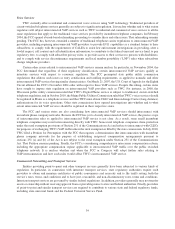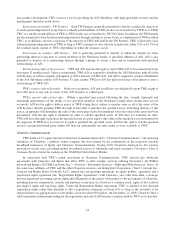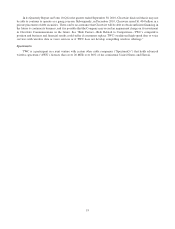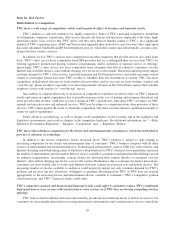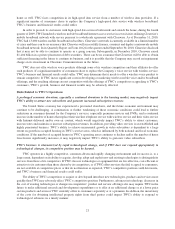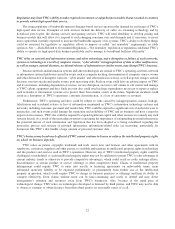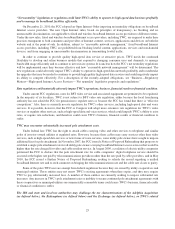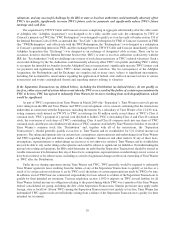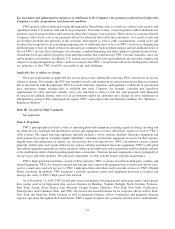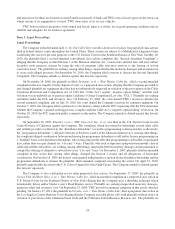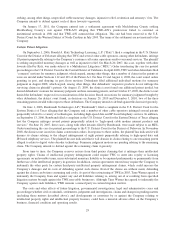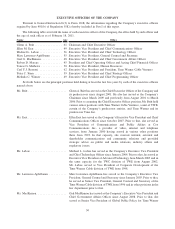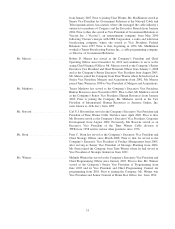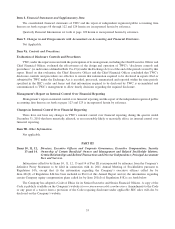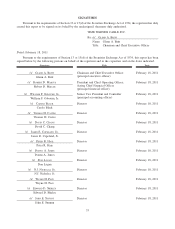Time Warner Cable 2010 Annual Report Download - page 37
Download and view the complete annual report
Please find page 37 of the 2010 Time Warner Cable annual report below. You can navigate through the pages in the report by either clicking on the pages listed below, or by using the keyword search tool below to find specific information within the annual report.“Net neutrality” legislation or regulation could limit TWC’s ability to operate its high-speed data business profitably
and to manage its broadband facilities efficiently.
On December 21, 2010, the FCC adopted an Open Internet Order imposing net neutrality obligations on broadband
Internet access providers. The new Open Internet rules, based on principles of transparency, no blocking and no
unreasonable discrimination, are applicable to fixed and wireless broadband Internet access providers to different extents.
Under the new rules, fixed and wireless broadband Internet access providers, including TWC, are required to make their
practices transparent to both consumers and providers of Internet content, services, applications and devices on both the
website and at the point-of-sale. In addition, subject to “reasonable network management,” fixed broadband Internet
access providers, including TWC, are prohibited from blocking lawful content, applications, services and non-harmful
devices, and from engaging in unreasonable discrimination in transmitting lawful traffic.
In order to continue to provide quality high-speed data service at attractive prices, TWC needs the continued
flexibility to develop and refine business models that respond to changing consumer uses and demands, to manage
bandwidth usage efficiently and to continue to invest in its systems. It is unclear how the FCC’s net neutrality regulations
will be implemented once they become effective and how “reasonable network management” will be determined. The
new regulations could adversely impact TWC’s ability to operate its high-speed data network profitably and to undertake
the upgrades that may be needed to continue to provide high quality high-speed data services and could negatively impact
its ability to compete effectively. For a description of the recently-adopted obligations, see “Business—Regulatory
Matters—High-speed Internet Access Services—‘Net neutrality’ legislative proposals and regulations.”
Rate regulation could materially adversely impact TWC’s operations, business, financial results or financial condition.
Under current FCC regulations, rates for BST video service and associated equipment are permitted to be regulated.
In the majority of its localities, TWC is not subject to BST video rate regulation, either because the local franchising
authority has not asked the FCC for permission to regulate rates or because the FCC has found that there is “effective
competition.” Also, there is currently no rate regulation for TWC’s other services, including high-speed data and voice
services. It is possible, however, that the FCC or Congress will adopt more extensive rate regulation for TWC’s video
services or regulate other services, such as high-speed data and voice services, which could impede TWC’s ability to raise
rates, or require rate reductions, and therefore could cause TWC’s business, financial results or financial condition to
suffer.
TWC may encounter substantially increased pole attachment costs.
Under federal law, TWC has the right to attach cables carrying video and other services to telephone and similar
poles of investor-owned utilities at regulated rates. However, because these cables may carry services other than video
services, such as high-speed data services or new forms of voice services, some utility pole owners have sought to impose
additional fees for pole attachment. In November 2007, the FCC issued a Notice of Proposed Rulemaking that proposes to
establish a single pole attachment rate for all utility pole owners carrying broadband Internet access services that would be
higher than the rate charged for video and cable modem service. In August 2009, a coalition of electric utility companies
petitioned the FCC to declare that the pole attachment rate for cable companies’ digital telephone service should be
assessed at the higher rate paid by telecommunications providers rather than the rate paid by cable providers, and in May
2010, the FCC issued a Further Notice of Proposed Rulemaking seeking to refresh the record regarding a unified
broadband Internet rate and to seek comment on bringing the telecommunications rate and the cable rate closer to parity.
Some of the poles TWC uses are exempt from federal regulation because they are owned by utility cooperatives and
municipal entities. These entities may not renew TWC’s existing agreements when they expire, and they may require
TWC to pay substantially increased fees. A number of these entities are currently seeking to impose substantial rate
increases. Any increase in TWC’s pole attachment rates or inability to secure continued pole attachment agreements with
these cooperatives or municipal utilities on commercially reasonable terms could cause TWC’s business, financial results
or financial condition to suffer.
The IRS and state and local tax authorities may challenge the tax characterizations of the Adelphia Acquisition
(as defined below), the Redemptions (as defined below) and the Exchange (as defined below), or TWC’s related
25



